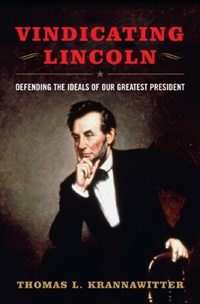
We had a guest in my "U.S. History since 1865" classes last week, Thomas Krannawitter from Hillsdale College in Michigan. Krannawitter was in town to lecture on his latest book, Vindicating Lincoln, and address my colleague's political science classes. It fit his schedule to visit my history classes, too. Even though the syllabus indicated that we were heading into the 1960s instead of the 1860s, my guest had no difficulty bridging the chronological gap with an analysis of changing perspectives on the Constitution and what came to be called civil rights.
Before proceeding, let me be clear that I do not know whether Krannawitter would call himself a libertarian. I did not ask him, nor do I know nearly enough about political philosophies to understand who might be flattered or horrified by association with the term. Wikipedia defines at least 10 strains of libertarianism, one of which includes small-government constitutionalists, and that's at least his ballpark. I should also admit that I have not read Vindicating Lincoln, so my comments refer to a guest lecture rather than to any published work. (It seems I'm on a roll with admitting things here. I don't enjoy Tolkien. There. I said it.)
To create a conversation using data points from my History 102 course, I asked Krannawitter, "How did civil rights legislation of the 1950s and ?60s continue or deviate from the Reconstruction Amendments we studied back in January?"
With a little prodding, my students were able to recall those amendments: the 13th, abolishing slavery; the 14th, granting equal protection to all American citizens; and the 15th, granting voting rights regardless of race, color, or prior servitude. Krannawitter then sketched an even longer historical narrative on the board, writing Declaration of Independence, Constitution, 13th, 14th, 15th Amendments, Plessy v. Ferguson, Brown v. Board of Education, and the Civil Rights Act of 1964. I will summarize his comments on each.
The Declaration of Independence, Krannawitter said, asserted equality among humans based on equal possession of natural rights. This seemed to be his ideal statement of political philosophy. The Constitution basically translated this notion of rights into government, but it compromised on slavery, because without such compromise it could not have amassed sufficient support of the governed to pass. In the middle of the 19th century, when that compromise frayed, Abraham Lincoln led the country into war to restore African Americans' natural rights. Lincoln had argued for these rights in his debates with Stephen Douglas, and he was willing to sacrifice millions of Union soldiers for this cause. Without Lincoln, Krannawitter averred, there might not have been a Civil War. Few other Americans of the era were willing to take support for natural, inalienable rights as far as he was.
Following the war, the Reconstruction Amendments brought the Constitution in line with the promise of the Declaration of Independence. Unfortunately, instead of ushering in a just and equitable republic, Reconstruction gave way to the long regime of Jim Crow, which Krannawitter described as nothing less than a brutal campaign of domestic terrorism. In Plessy v. Ferguson, an 1896 case about railroad cars in Louisiana, the Supreme Court upheld the Jim Crow emphasis on racial segregation, allowing for "separate but equal" facilities. Only Justice John Marshall Harlan dissented from the ruling, complaining not that separate facilities were inherently equal, but that any law taking account of race was automatically unconstitutional, because the Constitution recognizes no such distinction. "There is no caste here," he wrote. "Our Constitution is color-blind, and neither knows nor tolerates classes among citizens. In respect of civil rights, all citizens are equal before the law." According to Krannawitter, Lincoln would have emphatically agreed.
In the 1954 case Brown v. Board of Education of Topeka, the Supreme Court threw out the separate but equal idea, but, to Krannawitter's chagrin, it did not use Harlan's reasoning. Instead, the Court drew on, among other things, a study by educational psychologists that asserted children were mentally harmed by segregation. In other words, the decision rested more on social science and the needs of groups (in this case, African-American children) than on natural individual rights enshrined in a color-blind Constitution. The Civil Rights Act of 1964 went even further in identifying and seeking to meet the needs of various demographic groups. Krannawitter finds the ubiquitous racial check-boxes on employment applications prompted by this act especially galling. He checks or writes in "other: human."
Most controversially, Krannawitter ended his guest stint in my class by suggesting that, despite President Obama's many evocations of the Lincoln legacy, the only thing the men have in common is Illinois roots. Lincoln, to Krannawitter, represents the individual rights school of thought. Obama comes from the group rights school founded by early 20th century Progressives (whom Krannawitter really dislikes). Lincoln saw the role of the U.S. government as preventing some citizens from infringing upon the natural rights of other citizens. The list of rights is small and never essentially changes. Obama, as a Progressive, sees the role of the government as granting rights not just for protection from other citizens, but for things like health care, a living wage, and decent housing. The list of rights grows whenever the government is willing and able to expand it.
I don't know if I agree with Krannawitter's narrative. It did make me wonder a lot about intersections between Christian thought and the individual vs. group rights debate. Many, but not all, of the founders who touted natural rights were Deists, taking their philosophical cues from the Enlightenment rather than the church. Many, but not all, of the activists in 20th century campaigns for civil rights were Christians. Off the top of my head, I can't think of any Scriptures that either identify "life, liberty, and the pursuit of happiness" as God-given rights or mandate Equal Employment Opportunity. I suspect that Lincoln, who could see both sides of so many issues, could see both sides of this one as well.

Support Our Work
Subscribe to CT for less than $4.25/month





























